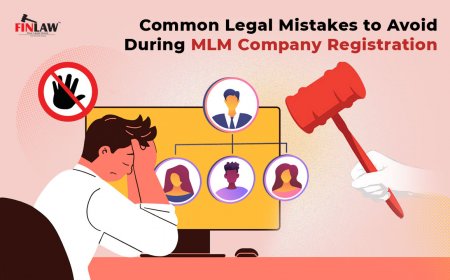Legal Challenges of Running a Multi-Level Marketing Business Model in India
Discover the legal challenges of running a multi level marketing business model in India, including compliance, regulations, and best practices.

The multi level marketing business model—also known as network marketing—has become a widely recognized business strategy in India. It provides individuals with opportunities to earn income through direct product sales and by recruiting new participants into their network. While this model can be highly lucrative, it also comes with significant legal challenges that entrepreneurs and distributors must carefully navigate.
This article explores the legal complexities of running a multi level marketing business model in India, highlighting regulatory requirements, common pitfalls, and practical strategies for compliance.
What is a Multi Level Marketing Business Model?
A multi level marketing business model is designed to allow distributors to earn commissions in two ways:
-
Direct Sales Commissions – Income from selling products or services directly to customers.
-
Recruitment Commissions – Income generated from recruiting new participants who make sales within the network.
In a legitimate MLM, the bulk of income should come from selling products or services, rather than recruiting members. Failure to maintain this balance can attract scrutiny from regulatory authorities, as it may resemble a pyramid scheme, which is illegal under Indian law.
Legal and Regulatory Framework Governing MLM in India
Operating an MLM business in India requires careful adherence to legal regulations. Key laws and guidelines include:
1. Direct Selling Guidelines, 2016
The Direct Selling Guidelines, 2016, issued by the Ministry of Consumer Affairs, provide the framework for legitimate MLM operations.
Key provisions include:
-
Product-Based Earnings: Earnings must primarily come from actual product sales, not recruitment.
-
Transparency: Companies must provide clear information about the business opportunity, products, and compensation plan.
-
No Entry Fees: Participants cannot be charged upfront fees for joining the network.
-
Exit Policy: Participants must have a transparent exit option without financial penalties.
2. Consumer Protection Act, 2019
The Consumer Protection Act, 2019 strengthens legal protections for consumers involved in MLM schemes.
-
Prohibition of Unfair Trade Practices: Misleading advertisements and false representations are prohibited.
-
Central Consumer Protection Authority (CCPA): The authority can take suo-motu action against deceptive practices.
-
Consumer Rights: Ensures that participants are informed about product quality, quantity, and price.
3. Prize Chits and Money Circulation Schemes (Banning) Act, 1978
This Act specifically targets illegal money circulation schemes, which often masquerade as MLM businesses. It prohibits earning primarily from recruitment and not from sales. Penalties include:
-
Imprisonment up to 3 years
-
Monetary fines
Common Legal Challenges in MLM Operations
Even legitimate MLM businesses often face legal hurdles. Some of the most common challenges include:
1. Misclassification as Pyramid Schemes
MLM companies can be misclassified as pyramid schemes if they emphasize recruitment over product sales. Warning signs include:
-
High focus on recruiting new members rather than selling products.
-
Low-value products used as a cover for recruitment.
-
Exaggerated or unrealistic income claims to attract participants.
2. Compliance with Regulations
Legal compliance requires attention to:
-
Direct Selling Guidelines adherence
-
Transparent record-keeping for commissions and participant data
-
Optional registration with the Department of Consumer Affairs to improve credibility
3. Consumer Protection Issues
MLM companies must provide mechanisms to address grievances:
-
Grievance Redressal Cells to resolve complaints efficiently
-
Clear Refund and Return Policies
-
Ensuring all business practices comply with the Consumer Protection Act
Notable Legal Cases in India
Amway India
Amway India faced legal scrutiny when the Enforcement Directorate investigated its operations for allegedly resembling a pyramid scheme. The Supreme Court upheld the ruling, emphasizing adherence to regulatory requirements.
Qnet
Qnet faced charges in 2016 for allegedly operating a pyramid scheme disguised as direct selling. The Delhi Police filed cases against its master franchise for prioritizing recruitment over sales. The Federation of Direct Selling Associations (FDSA) rejected their application citing compliance issues.
Best Practices for MLM Compliance
To operate a multi level marketing business model legally and ethically in India, businesses should follow these practices:
-
Focus on Genuine Product Sales: Ensure the majority of earnings come from selling tangible products.
-
Limit Recruitment-Based Earnings: Avoid schemes that reward participants mainly for recruiting new members.
-
Maintain Transparency: Provide accurate information about products, services, and income potential.
-
Establish Grievance Redressal Systems: Set up processes to handle consumer complaints promptly.
-
Regular Compliance Audits: Conduct periodic reviews to ensure alignment with laws and guidelines.
Emerging Legal Considerations in MLM
With the rise of digital MLM platforms, companies are facing new challenges:
-
Online Recruitment Risks: Digital channels can accelerate recruitment but increase regulatory scrutiny.
-
Data Privacy Compliance: Companies must comply with India’s data protection laws when handling participant information.
-
Cross-Border Operations: International MLMs must navigate foreign laws while adhering to Indian regulations.
FAQs: Multi Level Marketing Business Model in India
Q1: Is MLM legal in India?
Yes, MLM is legal if it complies with the Direct Selling Guidelines, Consumer Protection Act, and does not operate as a pyramid scheme.
Q2: What is the difference between MLM and a pyramid scheme?
MLM earns primarily from product sales, while pyramid schemes rely mainly on recruitment for income.
Q3: Can participants be charged an entry fee in MLM?
No, upfront entry fees are prohibited under the Direct Selling Guidelines, 2016.
Q4: How can MLM companies avoid legal challenges?
By maintaining transparency, focusing on product sales, implementing grievance mechanisms, and conducting regular audits.
Conclusion
The multi level marketing business model offers significant business opportunities in India, but it comes with substantial legal responsibilities. Companies and participants must operate transparently, comply with all regulatory requirements, and prioritize genuine product sales over recruitment-based earnings. By following best practices, MLM businesses can establish a legally compliant, ethical, and sustainable model that benefits both the company and its participants.
What's Your Reaction?



















